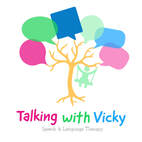Early Language Advice
Lots of children learn to talk with very little help. However some children find this difficult and can really benefit from parents and others making small adjustments to the way they talk with them during the day. These adjustments can help your child make progress.
- Let your child take the lead in play. Let them choose the toys they want to play with and how they want to play with them e.g. when playing with duplo they might not want to create a building but instead push the blocks off the table one by one, watching them fall. Join in with their game and imitate what they are doing. This will help to gain their attention and be a good opportunity for them to learn simple words from you.
- Comment alongside the play e.g. say ‘weeee’ or ‘oh oh’ or ‘blocks falling off the table’, or ‘ready steady….go’ as the child pushes the blocks off the table.
- Repeat simple phrases over and over again for your child to hear. Repetition of the same word is better than saying lots of different words.
- Give choices whenever possible to help your child learn and use single words to get a desired item e.g. ‘do you want an apple or an orange?’
- Try to use real objects when giving choices so the child can see the item and hear you name it.
- Break your sentences down into short sections. Giving breaks between phrases can help your child to process bits of information at a time.
- Name items correctly when your child has attempted to say it. Try not to repeat the way they have said it or simply get the item they have requested without naming it correctly several times for them to hear.
- Add more words to your child’s simple phrases or single words. If your child can now say ‘car’, when they see and name a car provide another word alongside it for them to hear to help them learn in time to link their new word with another one e.g. ‘big car’, ‘fast car’, ‘noisy car’.
- Praise your child for any attempts they make to communicate.
- Do not make them name things as a test. Talk naturally to them so that when they have a functional need to say a word give them the opportunity to do so e.g. when requesting an item or when seeing something out of the window.
N.B. This advice is only to be used alongside therapy and with support and guidance from a Speech and Language Therapist.
Email Address: talkingwithvicky@gmail.com

